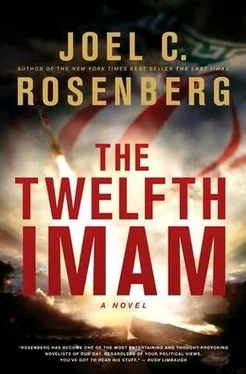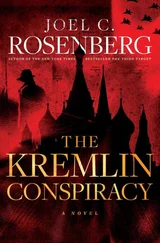Najjar was electrified when he read, “The Mahdi is alive. He visits different places and takes an intelligent interest in world events. He often attends the assemblies of the faithful but does not disclose his true identity. He will reappear on the appointed day, and then he will fight against the forces of evil, lead a world revolution, and set up a new world order based on justice, righteousness, and virtue.”
To the very core of his being, Najjar believed these words to be true. He was absolutely convinced that he had seen the Promised One at least twice in his life, first as a child on the day Ayatollah Khomeini had died, and again in Baghdad the day he saw the Iraqi nuclear scientist kidnapped and his family gunned down in the streets. Najjar had prayed every day since that he would have the opportunity to see the Promised One again. But he had never dared tell anyone of his encounters, not even Sheyda, whom he loved more than life. He feared she would think he was boasting or lying or hallucinating or crazy.
But was it really necessary to prepare the way for the Twelfth Imam by building a nuclear weapon, by annihilating Israel and the United States and other enemies of Islam? Dr. Saddaji obviously believed it was. Najjar, too, had once believed that, but now he wasn’t so sure. Worse, he now feared that by authorizing the beheading of a man who had been forced into the Iranian nuclear program years earlier-a man whose wife and child Najjar himself had seen murdered-Sheyda’s father had become part of the “forces of evil” whom the Promised One was coming to judge. It saddened and sickened him, but what could he do? He couldn’t tell Sheyda. It would shatter her. To whom, then, could he turn?
Tehran, Iran
Abdol Esfahani was not a big fish.
In the grand scheme of Iran Telecom’s communications empire, he was a minnow. But at least he was nibbling.
As Iran Telecom’s deputy director of technical operations, Esfahani was in charge of the day-to-day mechanics of turning the company’s ambitious strategic overhaul from concept to reality. He hadn’t negotiated the massive contract between Iran Telecom and Nokia Siemens Networks. Nor had he been involved in the subcontract NSN had inked with Munich Digital Systems. But all of the consultants and technical support teams that NSN already had in Iran ultimately reported to him, as would the MDS teams that were about to arrive in force.
David had no idea what Esfahani wanted to discuss, nor did Eva. He guessed the man simply wanted to look them in the eye, take their measure, and establish clear lines of authority and responsibility before the MDS tech teams arrived. After all, MDS’s role was a critical one: installing state-of-the-art call routers and proprietary software systems capable of handling millions of calls per minute, all of which would also integrate voice, data, and video services through the new fiber-optic and wireless networks NSN was building. The scope of the work was staggering. It was going to be complicated, time-consuming, and expensive. Esfahani no doubt wanted to make sure he was on a first-name basis with the senior Farsi-speaking project managers on the MDS team.
The breakfast meeting was set for seven thirty in the penthouse conference room of Iran Telecom’s headquarters in downtown Tehran. By the time Eva and David-traveling as Reza Tabrizi-landed at Imam Khomeini International Airport, cleared an extensive passport control and customs process, checked into separate rooms at the Simorgh Hotel on Vali-Assr Avenue, showered, changed, and got back into their hired car-followed the entire time by Iranian intelligence agents-they were lucky to make it to the meeting on schedule. With less than five minutes to spare, they sprinted into the main lobby and presented their IDs and a faxed letter of invitation. Only then were they directed to the ninth floor. There they were greeted by a lovely but somewhat-timid young receptionist wearing a black, full-length traditional woman’s cloak known as a chador and a dark green headscarf that not only accented her shy, green eyes but nearly matched the color of Eva’s headscarf as well.
“Welcome to Iran Telecom,” she said, stammering somewhat and unable to make eye contact, even with Eva. “My name is Mina.”
“Thank you, Mina,” Eva said, taking the lead. “It’s good to be here, despite all that traffic.”
“Yes, it’s quite challenging,” Mina said, still not looking at them but rather at the letter of invitation. “Forgive me, but which one of you is Mr. Tabrizi?”
It was an odd question, David thought, given the fact that he was the only man standing there. “That would be me,” he replied.
Mina glanced at him, then looked away quickly. “Are we still waiting for Mr. Fischer?” she asked.
“Actually,” Eva said, “that appears to be a mistake on the invitation. It’s supposed to be Ms. Fischer, not Mr. And that would be me.”
She held out her hand to shake Mina’s. But Mina, startled, didn’t take it.
“ Ms. Fischer?”
“That’s right,” Eva said, still holding out her hand.
“There’s no Mr. Fischer?”
“No, just me.” Eva awkwardly withdrew her unwelcome hand, now looking as perplexed as the receptionist.
“ You are the project manager for MDS?” Mina asked.
Eva forced a smile. “Yes; is there a problem?”
Mina looked up, stared at Eva for a moment, then looked away again. “Please have a seat,” she said crisply, picking up her phone and dialing. “It will be a few minutes.”
A moment later, Mina hung up the phone, excused herself, and stepped into Mr. Esfahani’s office, leaving the door open a crack behind her. David could hear whispering for a few moments, and then came the explosion.
“What? Are you certain?” yelled a man David figured for Esfahani.
He could hear Mina talking, but she spoke so quietly he couldn’t make out what she was saying.
“A woman?” the man shouted. “They sent a woman? And you let them? Don’t you know how close we are, you fool? Don’t you know how pious we must be? He’s coming at any moment. We must be ready!” Something glass or ceramic crashed against the wall and shattered.
David turned to Eva. This was not good. Esfahani was screaming at the top of his lungs. They could hear the man’s fist slamming into his desk. They could hear his secretary quietly sobbing. They heard him curse her for daring to think that he would ever have a woman running such an important project. He threatened to fire her. “How could you make such a stupid mistake?” he roared. “How could you bring dishonor into this office at such a time as this?” He began cursing NSN and MDS for having the gall to think he would accept a woman as a project manager. And then Esfahani, a thin man-almost gaunt-balding, and red as a beet, stormed out of his office, not stopping to look at either David or Eva. He blew through the reception area and boarded the elevator, and before they knew it, he was gone.
David, barely believing what he had just witnessed, turned to his colleague. Eva was pale. She was so deeply shaken, he wanted to give her a hug. But he could not, of course. Touching a woman who was not his wife, and doing so in public, risked turning the crisis into a full-blown cultural catastrophe. He didn’t know what to do or say to Eva, much less to Mina. The secretary was crying and muttering to herself and trying to clean up whatever had been destroyed in Esfahani’s office. This wasn’t something they trained you for at Langley. But David knew he had to do something to salvage this situation. The stakes were higher than the feelings of these two women. This was the CIA’s only door into Iran Telecom, and it had just been slammed in their faces.
Читать дальше












